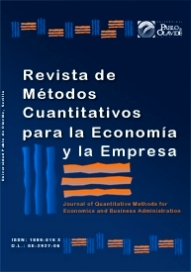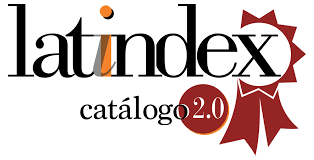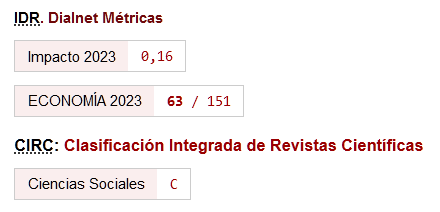Mejorando el intercambio de conocimientos a través de colaboraciones basadas en la confianza y liderazgo transformacional
DOI:
https://doi.org/10.46661/rev.metodoscuant.econ.empresa.7570Palabras clave:
Liderazgo transformacional, colaboración basada en la confianza, intercambio de conocimientosResumen
El objetivo de la presente investigación es examinar el efecto de la colaboración basada en la confianza y el liderazgo transformacional idealizado en el intercambio de conocimientos. Los datos utilizados en la presente investigación son primarios y proceden de cuestionarios distribuidos a encuestados seleccionados. La población está formada por todos los profesores de las universidades privadas de Java Central, Indonesia, que poseen la calificación A en la acreditación institucional. La razón es que la población es homogénea por naturaleza. La muestra analizada es de 162 encuestados y los resultados de la investigación indican que la influencia idealizada del liderazgo transformacional afecta positivamente a la colaboración basada en la confianza. La investigación no logra demostrar el efecto del liderazgo transaccional de recompensa contingente sobre la colaboración basada en la confianza y el intercambio de conocimientos. Así, la presente investigación contribuye a la literatura relativa a la importancia de la colaboración basada en la confianza para aumentar el intercambio de conocimientos. Se trata del primer estudio que examina el papel de la colaboración basada en la confianza en la relación entre el liderazgo transformacional de influencia idealizada y el intercambio de conocimientos. La colaboración basada en la confianza es la novedad de la investigación, es decir, la derivación de las dos teorías. El hallazgo refuerza una de las principales corrientes de la literatura y aporta más pruebas empíricas sobre la relación entre el liderazgo transformacional y el intercambio de conocimientos de que la relación entre los dos es de naturaleza indirecta.
Descargas
Citas
Agyemang, F. G., Boateng, H., & Dzandu, M. D. (2017). Examining intellectual stimulation, idealised influence and individualised consideration as an antecedent to knowledge sharing: Evidence from Ghana. Knowledge Management and E-Learning, 9(4), 484-498. https://doi.org/10.34105/j.kmel.2017.09.030
Ahmed, F., Shahzad, K., Aslam, H., Bajwa, S. U., & Bahoo, R. (2016). The Role of Collaborative Culture in Knowledge Sharing and Creativity among Employees. Pakistan Journal of Commerce & Social Sciences, 10(2), 335-358. Business Source Complete, EBSCOhost
Akosile, A., & Olatokun, W. (2020). Factors influencing knowledge sharing among academics in Bowen University, Nigeria. Journal of Librarianship and Information Science, 52(2), 410-427. https://doi.org/10.1177/0961000618820926
Akpotu, C., & Tamunosiki-Amadi, J. (2013). Transformational Leadership and Knowledge Sharing in ICT Based Organizations in Nigeria. International Journal of Business and Social Science, 4(12), 100-107.
Al-Alawi, A. I., Al-Marzooqi, N. Y., & Mohammed, Y. F. (2007). Organizational culture and knowledge sharing: Critical success factors. In Journal of Knowledge Management. 11(2). 22-42. https://doi.org/10.1108/13673270710738898
Al-Husseini, S., El Beltagi, I., & Moizer, J. (2021). Transformational leadership and innovation: the mediating role of knowledge sharing amongst higher education faculty. International Journal of Leadership in Education, 24(5), 670-693. https://doi.org/10.1080/13603124.2019.1588381
Al-Husseini, S., & Elbeltagi, I. (2018). Evaluating the effect of transformational leadership on knowledge sharing using structural equation modelling: the case of Iraqi higher education. International Journal of Leadership in Education, 21(4), 506-517. https://doi.org/10.1080/13603124.2016.1142119
Allameh, S. M., Sarand, V. F., & ... (2015). Assessing the impact of transformational leadership on knowledge sharing. … Research Journal of …, 3(5), 213-220. https://scholar.archive.org/work/jskr23bzgfbvpbsjimdqxuxive/access/wayback/http://irjmsjournal.com/wp-content/uploads/paper128.pdf
Analoui, B. D., Hannah Doloriert, C., & Sambrook, S. (2012). Leadership and knowledge management in UK ICT organisations. Journal of Management Development, 32(1), 4-17. https://doi.org/10.1108/02621711311286892
Asmawi, A., Zakaria, S., & Wei, C. C. (2013). Understanding transformational leadership and R & D culture in Malaysian universities. Innovation: Management, Policy and Practice, 15(3), 287-304. https://doi.org/10.5172/impp.2013.15.3.287
Atapattu, M., & Ranawake, G. (2017). Transformational and Transactional Leadership Behaviours and their Effect on Knowledge Workers' Propensity for Knowledge Management Processes. Journal of Information and Knowledge Management, 16(3), 1-23. https://doi.org/10.1142/S0219649217500265
Bass, B. M., & Avolio, B. J. (1994). Improving organizational effectiveness through transformational leadership. SAGE Publications Sage CA: Los Angeles, CA. https://books.google.co.id/books?hl=id&lr=&id=_z3_BOVYK-IC&oi=fnd&pg=PP11&dq=Improving++organizational+effectiveness+through+transformational+leadership&ots=aTyX0eGkLE&sig=j9IFnf71L-PXIr_xszZpnq1p0eA&redir_esc=y#v=onepage&q=Improving organizational effec
Bass, B. M., Avolio, B. J., Jung, D. I., & Berson, Y. (2003). Predicting unit performance by assessing transformational and transactional leadership. Journal of Applied Psychology, 88(2), 207-218. https://doi.org/10.1037/0021-9010.88.2.207
Bedwell, W. L., Wildman, J. L., DiazGranados, D., Salazar, M., Kramer, W. S., & Salas, E. (2012). Collaboration at work: An integrative multilevel conceptualization. Human Resource Management Review, 22(2), 128-145. https://doi.org/10.1016/j.hrmr.2011.11.007
Boateng, H., & Agyemang, F. G. (2015). The Role of Culture in Knowledge Sharing in a Public-Sector Organization in Ghana: Revisiting Hofstede's Model. International Journal of Public Administration, 38(7), 486-495. https://doi.org/10.1080/01900692.2014.949743
Boateng, H., & Agyemang, F. G. (2016). A qualitative insight into key determinants of knowledge sharing in a public sector institution in Ghana. Information Development, 32(1), 35-43. https://doi.org/10.1177/0266666914525650
Bradshaw, R., Chebbi, M., & Oztel, H. (2015). Leadership and Knowledge Sharing. Asian Journal of Business Research, 4(3), 1-20. https://doi.org/10.14707/ajbr.150001
Braun, S., Peus, C., Weisweiler, S., & Frey, D. (2013). Transformational leadership, job satisfaction, and team performance: A multilevel mediation model of trust. Leadership Quarterly, 24(1), 270-283. https://doi.org/10.1016/j.leaqua.2012.11.006
Burke, B. F. 2007. Adaptive Leadership As A Facilitator Of Public Engagement On Environmental. Sustainability Issues Administrative Theory & Praxis. 29 (3): 412-431. https://doi.org/10.1080/10841806.2007.11029604
Cha, J., Kim, Y., Lee, J. Y., & Bachrach, D. G. (2015). Transformational Leadership and Inter-Team Collaboration: Exploring the Mediating Role of Teamwork Quality and Moderating Role of Team Size. Group and Organization Management, 40(6), 715-743. https://doi.org/10.1177/1059601114568244
Chen, J., Jiao, H., & Zhao, X. (2016). A Knowledge-Based Theory of the Firm: Managing Innovation in Biotechnology. Chinese Management Studies, 11(1), 41-58.https://doi.org/10.1108/CMS-11-2015-0273
Chen, L. Y., & Barnes, F. B. (2006). Leadership Behaviors and Knowledge Sharing in Professional Service Firms Engaged in Strategic Alliances. The Journal of Applied Management and Entrepreneurship, 11(2), 51.
Chen, Y. S., Chang, C. H., & Lin, Y. H. (2014). Green transformational leadership and green performance: The mediation effects of green mindfulness and green self-efficacy. Sustainability (Switzerland), 6(10), 6604-6621. https://doi.org/10.3390/su6106604
Chiu, C. M., Hsu, M. H., & Wang, E. T. G. (2006). Understanding knowledge sharing in virtual communities: An integration of social capital and social cognitive theories. Decision Support Systems, 42(3), 1872-1888. https://doi.org/10.1016/j.dss.2006.04.001
Crawford, C. B. (2005). Effects of transformational leadership and organizational position on knowledge management. Journal of Knowledge Management, 9(6), 6-16. https://doi.org/10.1108/13673270510629927
Davenport, B. T. H., Prusak, L., & Webber, A. (2003). Working knowledge: how organizations manage what they know [Book Review]. IEEE Engineering Management Review, 31(4), 137-137. https://doi.org/10.1109/EMR.2003.1267012
De Cremer, D., & Van Knippenberg, D. (2002). How do leaders promote cooperation? The effects of charisma and procedural fairness. Journal of Applied Psychology, 87(5), 858-866. https://doi.org/10.1037/0021-9010.87.5.858
De Long, D. W., & Fahey, L. (2000). Diagnosing cultural barriers to knowledge management. Academy of Management Executive, 14(4), 113-127. https://doi.org/10.5465/ame.2000.3979820
Dirks, K. T., & Ferrin, D. L. (2002). Trust in leadership: Meta-analytic findings and implications for research and practice. Journal of Applied Psychology, 87(4), 611-628. https://doi.org/10.1037/0021-9010.87.4.611
Du, R., Ai, S., & Ren, Y. (2007). Relationship between knowledge sharing and performance: A survey in Xi'an, China. Expert Systems with Applications, 32(1), 38-46. https://doi.org/10.1016/j.eswa.2005.11.001
Fathi, N. M., Eze, U. C., & Gan, G. G. G. (2009). Knowledge sharing in an electronics manufacturing firm: Evidence from Malaysia. IEEM 2009 - IEEE International Conference on Industrial Engineering and Engineering Management, April 2016, 44-48.https://doi.org/10.1109/IEEM.2009.5373452
Fu, S. S. S., & Lee, M. K. O. (2005). IT-based knowledge sharing and organizational trust: The development and initial test of a comprehensive model. Proceedings of the 13th European Conference on Information Systems, Information Systems in a Rapidly Changing Economy, ECIS 2005.
Gillespie, N. A., & Mann, L. (2004). Transformational leadership and shared values: The building blocks of trust. Journal of Managerial Psychology, 19(6), 588-607. https://doi.org/10.1108/02683940410551507
Goh, S. C. (2002). Managing effective knowledge transfer: An integrative framework and some practice implications. Journal of Knowledge Management, 6(1), 23-30. https://doi.org/10.1108/13673270210417664
Gruenfeld, D. H., Mannix, E. A., Williams, K. Y., & Neale, M. A. (1996). Group composition and decision making: How member familiarity and information distribution affect process and performance. Organizational Behavior and Human Decision Processes, 67(1), 1-15. https://doi.org/10.1006/obhd.1996.0061
Hair, J. F., Black, W. C., Babin, B. J., Anderson, R. E., Black, W. C., & Anderson, R. E. (2019). Multivariate Data Analysis (Eighth Edi). Cengage Learning.
Hillman, A. J., Withers, M. C., & Collins, B. J. (2009). Resource dependence theory: A review. Journal of Management, 35(6), 1404-1427. https://doi.org/10.1177/0149206309343469
Ismail, A., Mohamad, M. H., Mohamed, A.-B. H., Rafiuddin, N. M., & Zhen, K. W. P. (2010). Transformational and Transactional Leadership Styles as a Predictor of Individual Outcomes. Theoretical and Applied Economics, Romania, XVII(6 (547)), 89-104. http://store.ectap.ro/articole/477_ro.pdf
Jahani. (2011). Is Reward System and Leadership Important in Knowledge Sharing Among Academics? American Journal of Economics and Business Administration, 3(1), 87-94. https://doi.org/10.3844/ajebasp.2011.87.94
Jolaee, A., Nor, K. M., Khani, N., & Yusoff, R. M. (2014). Factors affecting knowledge sharing intention among academic staff. International Journal of Educational Management, 28(4), 413-431. https://doi.org/10.1108/IJEM-03-2013-0041
Jung, D. D. I., & Avolio, B. B. J. (2000). Opening the black box: An experimental investigation of the mediating effects of trust and value. Journal of Organizational Behavior, 21(8), 949. http://search.ebscohost.com/login.aspx?direct=true&db=bth&AN=13620135&site=ehost-live%5Cnhttp://onlinelibrary.wiley.com/doi/10.1002/1099-1379(200012)21:8%3C949::AID-JOB64%3E3.0.CO;2-F/abstract%5Cnhttp://dx.doi.org/10.1002/1099-1379(200012)21:8%3C949::AID-
Jury, A. W., Bordia, P., & Krebs, S. A. (2005). Transformational leadership within virtual teams: Examining the mediating influence of trust and role clarity for performance and knowledge sharing. Australian Journal of Psychology, 57(October), 132.https://www.researchgate.net/publication/43456433
Kohn, A. (1993). Why Incentive Plans Cannot Work. Harvard Business Review, September-October, 54-63.
Le, P. B., & Lei, H. (2018). The mediating role of trust in stimulating the relationship between transformational leadership and knowledge sharing processes. Journal of Knowledge Management, 22(3), 521-537. https://doi.org/10.1108/JKM-10-2016-0463
Lee, H., & Choi, B. (2003). Journal of Management Information Systems, Informa-tion and Management. Journal of Organizational Computing and Electronic Commerce, 20(1), 179-228. https://doi.org/10.1080/07421222.2003.11045756
Longoria, R. A. (2005). Is inter-organizational collaboration always a good thing? Journal of Sociology and Social Welfare, 32(3), 123-138. https://doi.org/10.15453/0191-5096.3095
Mohammad. M. S. (2012). Transformational Leadership and Employees' Job Satisfaction and Commitment: A Structural Equation Investigation. Journal of American Science, 8(7), 11-19. http://www.americanscience.org.
Mackenzie, S. B., Podsakoff, P. M., & Rich, G. A. (2001). Transformational and Transactional Leadership and Salesperson Performance The Dangers of Poor Construct Conceptualization View project. Journal of the Academy of Marketing Science, 29(2), 115-134.https://doi.org/10.1177/03079459994506
Mansoori, H., Taheridemne, M., & Monfared, A. R. K. (2012). Evaluating effect of knowledge management strategy on human resource management performance using BSC approach. Journal of Information Processing and Management, 27(1), 263-278.
Masa'deh, R., Obeidat, B. Y., & Tarhini, A. (2016). A Jordanian empirical study of the associations among transformational leadership, transactional leadership, knowledge sharing, job performance, and firm performance: A structural equation modelling approach. Journal of Management Development, 35(5), 681-705. https://doi.org/10.1108/JMD-09-2015-0134
Mayer, R. C., Davis, J. H., Schoorman, F. D., Mayer, R. C., & Davis, J. H. (1995). An Integrative Model of Organizational Trust. Academy of Management Review, 20(3), 709-734. https://doi.org/10.1002/j.2050-0416.1927.tb05040.x
McEvily, B., Perrone, V., & Zaheer, A. (2003). Trust as an organizing principle. Organization Science, 14(1), 91-103.https://doi.org/10.1287/orsc.14.1.91.12814
McKnight, D. H., Choudhury, V., & Kacmar, C. (2002). Developing and validating trust measures for e-commerce: An integrative typology. Information Systems Research, 13(3), 334-359. https://doi.org/10.1287/isre.13.3.334.81
Mohamad, M. H., & Yahya, K. K. (2016). Does Transactional Leadership Style Influences Subordinates' Trust? an Empirical Study in the Perspective of Local Authorities' Employees. International Journal of Accounting, Finance and Business, 1(2), 1-12. www.ijafb.com
Nahapiet, J., & Ghoshal, S. (1998). Social Capital, Intellectual Capital, and the Organizational Advantage Author. In Source: The Academy of Management Review. 23(2). 242-266.https://doi.org/10.5465/amr.1998.533225
Nelson, K. M., & Cooprider, J. G. (1996). the Contribution of Shared Knowledge To Is Group Performance. MIS Quartely, 409-432.
https://doi.org/10.2307/249562
Nguyen, H. N., & Mohamed, S. (2011). Leadership behaviors, organizational culture and knowledge management practices: An empirical investigation. Journal of Management Development, 30(2), 206-221. https://doi.org/10.1108/02621711111105786
Nguyen, T. P. L., Nguyen, K. N., Do, T. D., & Nguyen, T. T. M. (2019). Knowledge sharing and innovative work behavior: The case of Vietnam. Uncertain Supply Chain Management, 7(4), 619-634. https://doi.org/10.5267/j.uscm.2019.5.001
Pillai, R., Schriesheim, C. A., & Williams, E. S. (1999). Fairness perceptions and trust as mediators for transformational and transactional leadership: A two-sample study. Journal of Management, 25(6), 897-933. https://doi.org/10.1177/014920639902500606
Podsakoff, P. M., Mackenzie, S. B., & Bommer, W. H. (1996). Transformational Leader Behaviors and Substitutes for Leadership as Determinants of Employee Satisfaction, Commitment, Trust, and Organizational Citizenship Behaviors The Dangers of Poor Construct Conceptualization View project Off duty deviance View proj. Journal of Management, 22(2), 259-298.https://doi.org/10.1177/014920639602200204
Podsakoff, P. M., Todor, W. D., Grover, R. A., & Huber, V. L. (1984). Situational Moderators of Leader Reward and Punishment Behaviors Fact or Fiction? Organizational Behavior and Human Performance, 34, 21-63.https://doi.org/10.1016/0030-5073(84)90036-9
Politis, J. D. (2003). The connection between trust and knowledge management: What are its implications for team performance. Journal of Knowledge Management, 7(5), 55-66. https://doi.org/10.1108/13673270310505386
Popper, M., & Lipshitz, R. (2000). Installing mechanisms and instilling values: The role of leaders in organizational learning. The Learning Organization, 7(3), 135-145. https://doi.org/10.1108/09696470010335854
Rawung, F. H., Wuryaningrat, N. F., & Elvinita, L. E. (2015). The Influence of Transformational and Transactional Leadership on Knowledge Sharing: An EMpirical Study on Small and Medium Business in Indonesia. Asian Academy of Management Journal, 20(1), 123-145.
Reid, F. (2003). Creating a Knowledge-Sharing Culture among Diverse Business Units. Employment Relations Today, 30(3), 43.
https://doi.org/10.1002/ert.10097
Reitz, H. J., Pfeffer, J., & Salancik, G. R. (1979). The External Control of Organizations: A Resource Dependence Perspective. In The Academy of Management Review (Vol. 4, Issue 2). Stanford Business Books. https://doi.org/10.2307/257794
Sandhu, M. S., Jain, K. K., & Ahmad, I. U. K. bte. (2011). Knowledge sharing among public sector employees: Evidence from Malaysia. International Journal of Public Sector Management, 24(3), 206-226. https://doi.org/10.1108/09513551111121347
Seonghee, K., & Boryung, J. (2008). An analysis of faculty perceptions: Attitudes toward knowledge sharing and collaboration in an academic institution. Library and Information Science Research, 30(4), 282-290. https://doi.org/10.1016/j.lisr.2008.04.003
Sveiby, K. E., & Simons, R. (2002). Collaborative climate and effectiveness of knowledge work - an empirical study. Journal of Knowledge Management, 6(5), 420-433. https://doi.org/10.1108/13673270210450388
Thomson, N. B., Rawson, J. V., Slade, C. P., & Bledsoe, M. (2016). Transformation and Transformational Leadership: A Review of the Current and Relevant Literature for Academic Radiologists. Academic Radiology, 23(5), 592-599.https://doi.org/10.1016/j.acra.2016.01.010
Ugwu, C. I., & Okore, A. M. (2020). Transformational and transactional leadership influence on knowledge management activities of librarians in university libraries in Nigeria. Journal of Librarianship and Information Science, 52(3), 864-879.https://doi.org/10.1177/0961000619880229
Vera, D., & Crossan, M. (2004). Strategic leadership and organizational learning. Academy of Management Review, 29(2), 222-240.https://doi.org/10.5465/AMR.2004.12736080
Vuori, V., & Okkonen, J. (2012). Knowledge sharing motivational factors of using an intra-organizational social media platform. Journal of Knowledge Management, 16(4), 592-603. https://doi.org/10.1108/13673271211246167
Wang, H. K., Tseng, J. F., & Yen, Y. F. (2014). How do institutional norms and trust influence knowledge sharing? An institutional theory. Innovation: Management, Policy and Practice, 16(3), 374-391. https://doi.org/10.1080/14479338.2014.11081994
Wang, S., & Noe, R. A. (2010). Knowledge sharing: A review and directions for future research. Human Resource Management Review, 20(2), 115-131. https://doi.org/10.1016/j.hrmr.2009.10.001
Wong, K. Y. (2005). Critical success factors for implementing knowledge management in small and medium enterprises. Industrial Management & Data Systems, 105(3), 261-279. https://doi.org/10.1108/02635570510590101
Yang, L. R., Huang, C. F., & Wu, K. S. (2011). The association among project manager's leadership style, teamwork and project success. International Journal of Project Management, 29(3), 258-267. https://doi.org/10.1016/j.ijproman.2010.03.006
Publicado
Cómo citar
Número
Sección
Licencia
Derechos de autor 2023 Suhana Suhana, Suharnomo Suharnomo, Fuad Mas’ud, Anwar Mansyur

Esta obra está bajo una licencia internacional Creative Commons Atribución-CompartirIgual 4.0.
El envío de un manuscrito a la Revista supone que el trabajo no ha sido publicado anteriormente (excepto en la forma de un abstract o como parte de una tesis), que no está bajo consideración para su publicación en ninguna otra revista o editorial y que, en caso de aceptación, los autores están conforme con la transferencia automática del copyright a la Revista para su publicación y difusión. Los autores retendrán los derechos de autor para usar y compartir su artículo con un uso personal, institucional o con fines docentes; igualmente retiene los derechos de patente, de marca registrada (en caso de que sean aplicables) o derechos morales de autor (incluyendo los datos de investigación).
Los artículos publicados en la Revista están sujetos a la licencia Creative Commons CC-BY-SA de tipo Reconocimiento-CompartirIgual. Se permite el uso comercial de la obra, reconociendo su autoría, y de las posibles obras derivadas, la distribución de las cuales se debe hacer con una licencia igual a la que regula la obra original.
Hasta el volumen 21 se ha estado empleando la versión de licencia CC-BY-SA 3.0 ES y se ha comenzado a usar la versión CC-BY-SA 4.0 desde el volumen 22.










